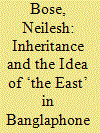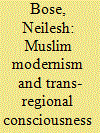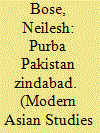|
|
|
Sort Order |
|
|
|
Items / Page
|
|
|
|
|
|
|
| Srl | Item |
| 1 |
ID:
163820


|
|
|
|
|
| Summary/Abstract |
Recent research on intellectual histories of the Global South explore the nature of inheritance and the incorporation of ideas from diverse places into colonial and post-colonial histories. Though research into the histories of science, liberalism and nationalism have multifaceted reference points in the discipline of history, histories of intellectuals in conversation with the history of decolonisation remain a missing link in the history of the twentieth century. Through engagement with the ‘Bengali Intellectuals Oral History Project’ (BIOHP), this paper argues that intellectuals from West Bengal, India, maintained a complex vector of inheritance with Western social thought when contrasted with their East Bengali/Pakistani/Bangladeshi counterparts. The primary interlocutors of eastern Bengali intellectuals were not ‘the West’, but were western Bengal, inside a regional, as opposed to an increasingly global, audience and marketplace of Indian intellectuals.
|
|
|
|
|
|
|
|
|
|
|
|
|
|
|
|
| 2 |
ID:
107956


|
|
|
|
|
| Publication |
2011.
|
| Summary/Abstract |
Histories of Marxism in South Asia often focus on the great men of colonial Indian politics, such as M. N. Roy, who imagined political futures away from nation or identity, or narrowly on activists like Muzaffar Ahmad, the founder of the Communist Party of India, without consideration of the regional-historical and intellectual contexts out of which such activism and imaginations sprang. Using the Bengali Muslim context of the early twentieth century, this article examines how Muslim activists imagined their identity outside of and beyond normative frameworks such as nation or religious community. This article specifically analyses Samyabadi, a left-oriented journal published in Calcutta from 1922 to 1925, in the larger context of communist developments in Bengal and throughout India. The findings offer exciting support for new research approaches to regional and religious identity in late colonial South Asia.
|
|
|
|
|
|
|
|
|
|
|
|
|
|
|
|
| 3 |
ID:
131770


|
|
|
|
|
| Publication |
2014.
|
| Summary/Abstract |
This paper details the history of the concept of Pakistan as debated by Bengali intellectuals and literary critics from 1940-1947. Historians of late colonial South Asia and analysts of Pakistan have focused on the Punjab along with colonial Indian 'Muslim minority' provinces and their spokesmen like Muhammed Ali Jinnah, to the exclusion of the cultural and intellectual aspects of Bengali conceptions of the Pakistan idea. When Bengal has come into focus, the spotlight has centred on politicians like Fazlul Huq or Hassan Shahid Suhrawardy. This paper aims to provide a corrective to this lacuna by analyzing Bengali Muslim conceptualizations of the idea of Pakistan. Bengali Muslim thinkers, such as Abul Mansur Ahmed, Abul Kalam Shamsuddin, and Farrukh Ahmed, blended concepts of Pakistan inside locally grounded histories of the Bengali language and literature and worked within disciplines of geography and political economy. Many Bengali Muslim writers from 1940 to 1947 creatively integrated concepts of Pakistan in poetry, updating an older Bengali literary tradition begun in earlier generations. Through a discussion of the social history of its emergence along with the role of geography, political thought, and poetry, this paper discusses the significance of 'Pak-Bangla' cultural nationalism within late colonial South Asian history.
|
|
|
|
|
|
|
|
|
|
|
|
|
|
|
|
|
|
|
|
|